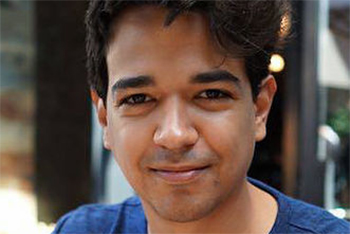
On Friday, November 4, some CSE students got in the swing of things ahead of Tuesday's presidential election. CSE grad students were invited to attend an Election Day Social Hour along the theme "Make CSE Great Again, #StrongerTogether." The parties were not divided by political labels, but rather by voters' perspectives on the most important research areas within CSE. "We settled one of the most fundamental questions in modern history," said second-year Ph.D. student Alex Gamero-Garrido. "To participate, you were required to pledge allegiance to one of the CSE research areas by voting for the greatest, researchest, most bigly research area in CSE for a stronger tomorrow."

Gamero-Garrido (at left) and fellow Ph.D. student Rob McGuiness invited students to use a Google Form to select their candidate from among 15 fields, including bioinformatics, human-computer interaction, and software engineering. The poll expressly requested, however, that "fellow CSE-tizens" not select their own research area. "Please don't choose your own," noted the pollsters. "Just don't."
Voting began at 4pm and ended just before 5pm. It was open to anyone on the cse-people email list (i.e., not just the graduate students attending the Social Hour in person). Students attending the event in the fourth-floor lobby of the CSE building, however, did have the opportunity to campaign and lobby other CSE students for the research area of their choice.
In the end, a consensus candidate emerged as the most potent research area for the future of computer science and engineering. It was… Artificial Intelligence (AI). The area won fourteen of the 52 votes cast. AI beat out Computer Architecture and Compilers, Human-Computer Interaction, and Security and Cryptography, which all tied for a distant second place in the (admittedly unscientific) poll.
Gamero-Garrido came by his interest in politics naturally. In 2011 he completed his undergraduate degree at Simon Bolivar University in his native Venezuela, and in 2012 worked as an analyst on the presidential campaign of Venezuelan opposition leader Henrique Capriles, who lost to the late Hugo Chavez. After that election, Gamero-Garrido did an M.S. in Technology and Policy at MIT prior to enrolling in the Ph.D. program at UC San Diego in 2015.
Gamero-Garrido's primary research involves Internet measurement, under CSE Prof. Alex Snoeren and Adjunct Prof. KC Claffy. Gamero-Garrido is also affiliated with the Center for Networked Systems (CNS), and collaborates on cyber security research with CSE Prof. Stefan Savage and department alumnus Kirill Levchenko (Ph.D. '08), who are, respectively, co-director and a research scientist in CNS.
The student also works under Claffy in the Center for Applied Internet Data Analysis (CAIDA), which Claffy directs.

